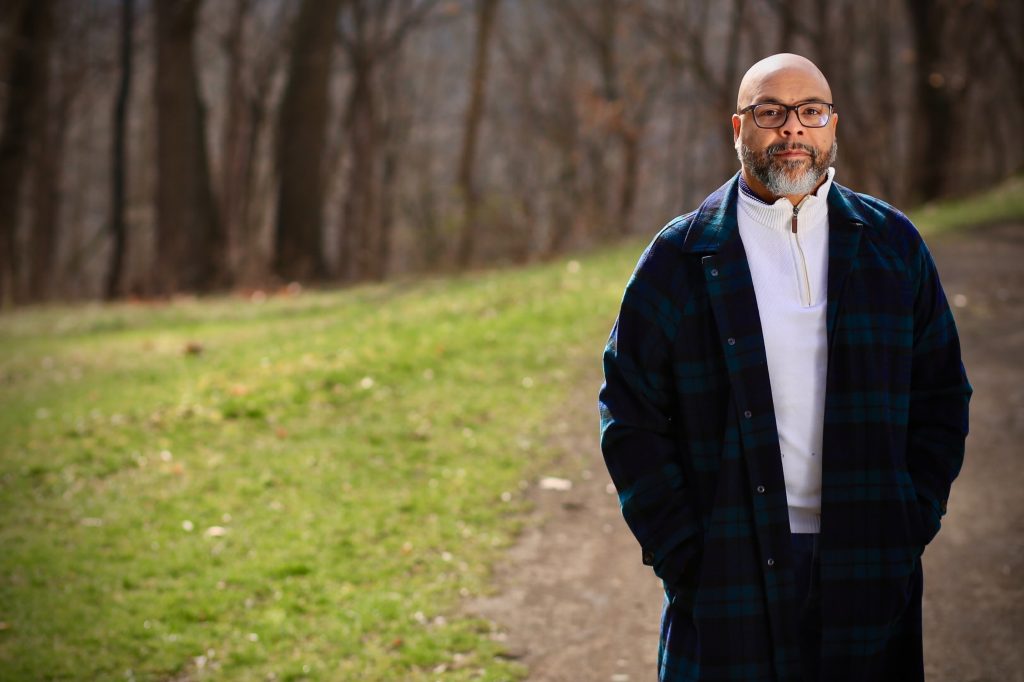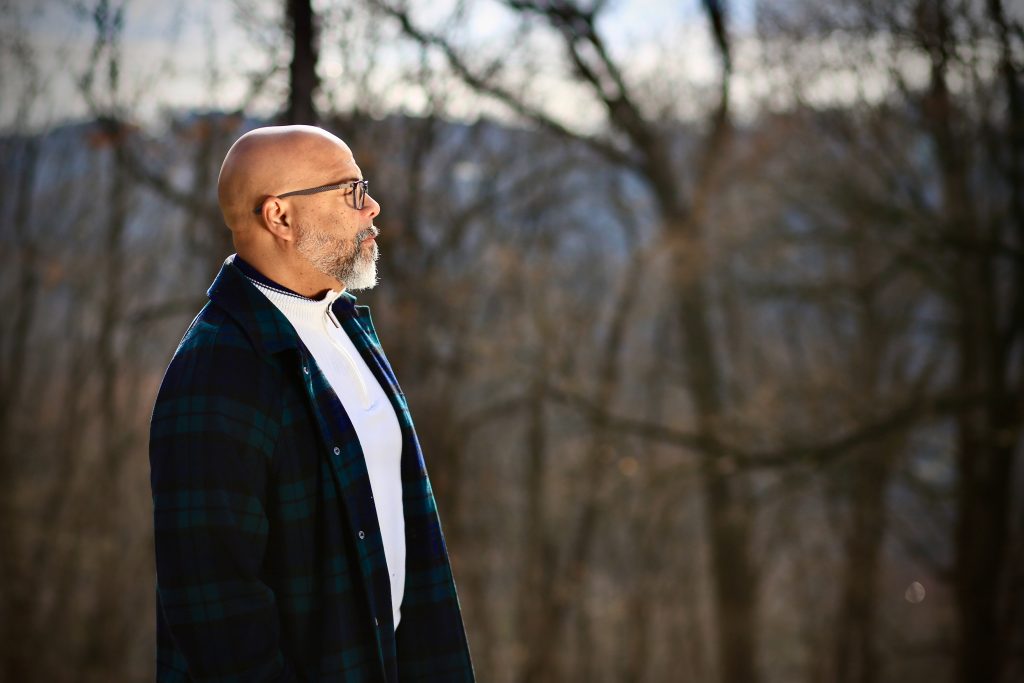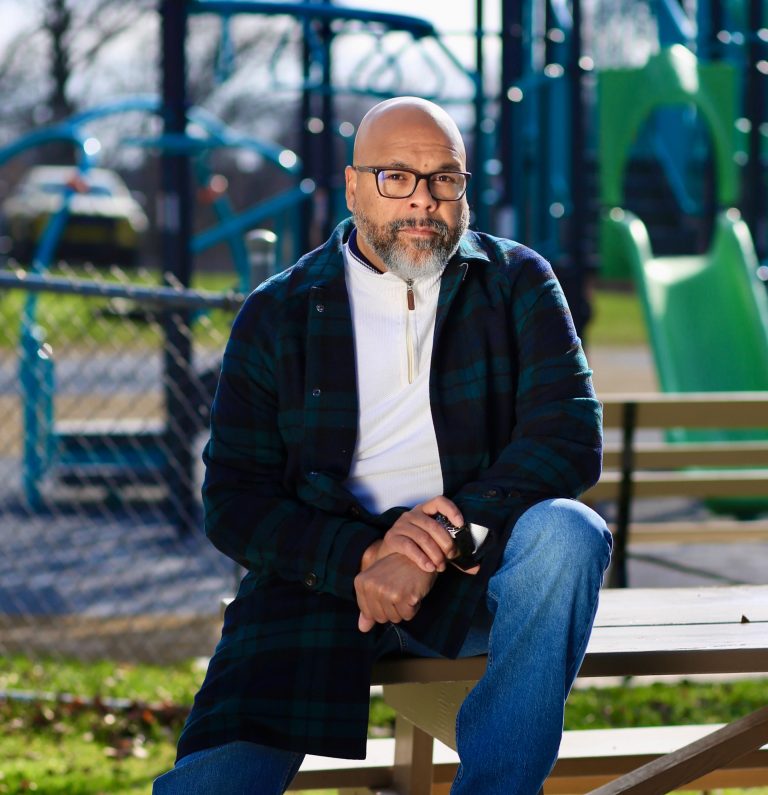His organization, UrbanKind, is advancing a unique approach to raising the quality of life in Pittsburgh and Allegheny County
By Hakim Hasan
Geographer, activist, lecturer, and gadfly Jamil Bey is the founder and CEO of the UrbanKind Institute. As a capstone of his advocacy work in Pittsburgh, Bey was nominated last month by Mayor Ed Gainey to serve as Director of the Department of City Planning.” He will step in as the Acting Director until confirmed by City Council.
When he was a teenager, Bey wanted to be an architect. But his hopes were dashed. He was not sufficiently prepared in mathematics to qualify for an architecture program. As a result, Bey simply passed through high school like many Black youths in ill-equipped schools. Upon graduation, he decided to become a Social Studies teacher.
Bey was born in 1967 in Beltzhoover, Pittsburgh, a suburban enclave of neat homes and working families. His father was a welder, and his mother was a stay-at-home mom. He is one of twelve children. During much of his adolescence, Beltzhoover was a stable community of homeowners, but, eventually, a shift away from stability began.
By 1986, two neighboring public housing projects closed, gang violence ensued, and public schools further deteriorated. Beltzhoover shifted from a secure community to one besieged by the onslaught of the crack cocaine epidemic.
“That sense of place that [Beltzhoover] was a solid community lasted into the early eighties,” Bey says. “Two things happened around the same time. First, they restructured the schools and so kids were going to different schools and different kids were coming into this neighborhood. At the same time, crack came to Pittsburgh.”
Like many boys coming-of-age, Bey was preoccupied with girls, but he was studious. He scored well on the SAT, particularly the math section, mainly because he was good at the multiple-choice questions. Bey graduated from Peabody High School in 1985. The mother of a girl he was interested in told Bey that he needed to consider going to college. He later earned a B.S. in Social Studies from Penn State University.
We provide an uncompromising commitment to outcomes by bringing the people most impacted and their perspectives into the solution—not as token participants, but as agents of change.
Jamil Bey, UrbanKind Institute
Bey, 56, remembers his first job as a Social Studies teacher at Clairton High School. “They did not have a library in the building. The library was three blocks away in the public library. The teachers did science experiments and the kids watched. These kids didn’t have a chance.”
Bey emphasizes that these were Black children from low-income backgrounds.
“I didn’t keep that job too long,” he says, noting that the powers that be pushed him out because he was going into the projects, getting the parents, and bringing them to the school board meetings.
“They told me that was none of my business,” he says. “That ain’t my job.”
Bey worked at Clairton from 1996 to 1998 and later at McKeesport from 1998 to 2004. Those eight years teaching represent the beginning of his journey as an activist.
“I went to McKeesport High School and learned to fight differently,” he recalls.
This was, in a way, Bey’s analytical rearview mirror. He never lost sight of the young people that he taught in high school and desperately wanted to help, but he needed analytical tools—a framework—to change what amounted to the cyclical plight of Black children trapped in mediocre public schools. So, he re-enrolled at Penn State University, where he subsequently earned his master’s and doctoral degrees in geography in 2007 and 2011, respectively.

Becoming a geographer was a major intervention in his evolution as a thought leader. Geography provided Bey with the tools of analysis to do what he refers to as “big picture” and “system change work.”
“The first law of geography is everything is related to everything else. There is no second law,” Bey says with a laugh.
At first glance, the long academic titles of both his master’s thesis (about competition for hydrocarbon resources in the Caspian Sea Basin) and his doctoral dissertation (about poverty and economic development in Barbados) seem a stark disjuncture from Bey’s years as a high school teacher.
But it was his graduate research that helped him understand the reality of war fought over resources—a war complicated by race and ethnic identity. His doctoral dissertation also revealed the local population’s own insight into poverty and capitalism.
His studies also shed light on the murderous reign of the crack epidemic in Pittsburgh and throughout America. Too often, young Black men and boys are selling drugs to people they grew up in close proximity to—and murdering them over turf (resources) and monetary spoils (capitalism). Listening to Bey reflect on his academic and activist journey, it becomes crystal clear that the r-word (resources) is the axis that governs our daily lives.”
When asked how all of this relates to “social justice,” Bey explains that he doesn’t use the term.
“I don’t use that language because I don’t think we can pursue a single type of justice because we have adopted and accepted an economic system that is based on exploitation and extraction,” he says. “But we have to think ‘big picture’ about justice: that multidimensional quality of life—housing, education, environment, social relationships and status, and environmental health.”
We have to think ‘big picture’ about justice: that multidimensional quality of life—housing, education, environment, social relationships and status, and environmental health.
Jamil Bey, UrbanKind Institute
Dr. Bey’s fight for “big picture” justice led to his founding the UrbanKind Institute, a consultancy, in 2005. The Institute, whose clients include philanthropy, local government, national and local non-profits, universities, and health care systems, just celebrated its 19th anniversary last February.
UrbanKind operates in four core areas: Community Engagement, Equity Based Facilitation, Program Evaluation and Research and Policy. Much of this can be subdivided between providing research reports to clients and engaging members of the communities they serve.
The organization’s name is a play on the word “humankind.” Bey says that he chose to capitalize the letter “K” to emphasize the importance of being kind in urban environments. He also characterizes the UrbanKind Institute as a “think-and-do tank.”
“Our primary value to our clients is our approach to problem solving,” he says. “We provide an uncompromising commitment to outcomes by bringing the people (those most impacted) and their perspectives into the solution—not as token participants, but as agents of change.”
When asked about examples of “agents of change” which give life to the “and-do” part of UrbanKind, Bey rattled off a list that speaks to the everyday people at the heart of his work.
“Young people involved in writing policy to submit to legislators, residents planting trees in their neighborhoods to mitigate climate change and to clean the air so that children can breathe more easily, and folks getting on-the-job training while rehabbing homes that members of their communities will own.”

Another example of his organization’s approach is its community engagement partnership with 1Hood Media* and Black Women Wise Women, LLC, a Pittsburgh based consulting agency. Together they created a Facebook Live podcast called “What Black Pittsburgh Needs to Know.” It began in 2020 during the COVID-19 pandemic and continues today. Episodes are on YouTube.
Hearing Bey publicly discuss real world issues impacting Pittsburgh’s Black community reminded me of the prolific Black writer and thinker James Baldwin. In Baldwin’s essay, “Malcolm and Martin,” published in Esquire magazine in April 1972, he writes, “Slave owners do not allow their slaves to compare notes.”
Thankfully, Bey’s approach to social transformation does allow for marginalized communities to compare notes from cities across America. The podcast provides keen insight into the ways Pittsburgh’s problems are not isolated social and political phenomena. This is where Bey’s first law of geography, “everything is related to everything else,” is instructive.
Regarding what comes next, Bey remains optimistic and certain about what lies ahead.
“We have to be disruptive,” he says. “We need a new narrative. And we need new language around this work.”
Hakim Hasan’s writings have appeared in Black Renaissance Noire, The New York Times Magazine, The Washington Post, and the San Francisco Chronicle.
*Editor’s Note: 1Hood Media is the publisher of BlackPittsburgh.com.


